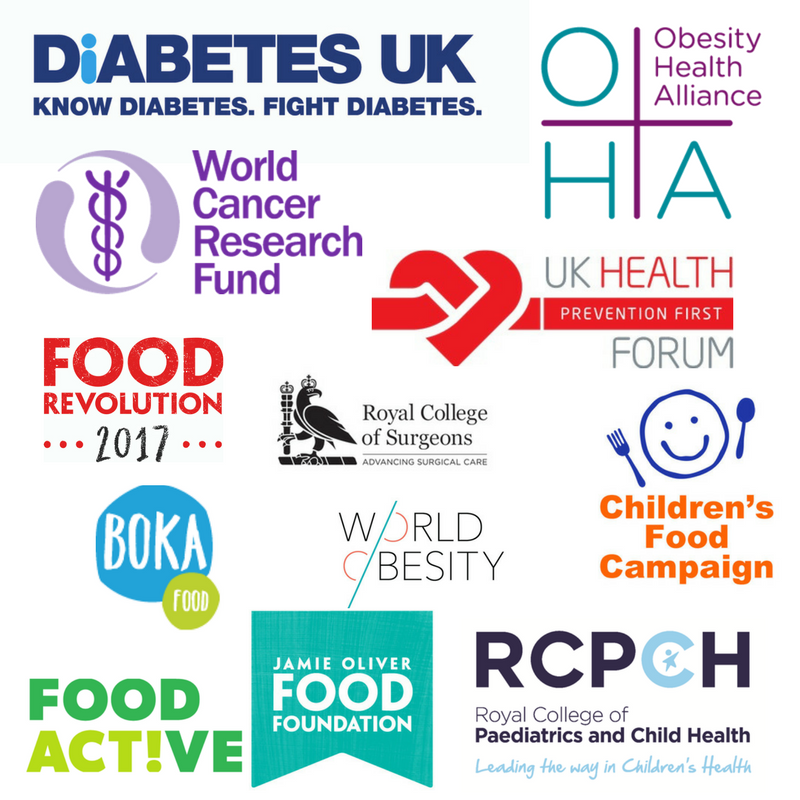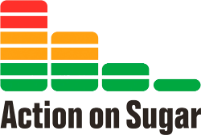Supporters
We'd like to thank all of this year's Sugar Awareness Week industry and charity supporters:

|
|
Obesity Health Alliance said: “Recently released childhood obesity statistics tell a devastating story. In England, almost one in four children are now overweight or obese when they start school and by the time they leave school this rises to over one in three. We know that we are all eating too much sugar – but it’s hard to make healthy choices when everyday food is loaded with sugar and our environment steers us to unhealthy choices with adverts and promotions. This Sugar Awareness Week we are calling on the food industry to reduce sugar and calories from food and the Government to restrict children’s exposure to junk food adverts with a 9pm watershed.” |
 |
Diabetes UK said: “Eating too much sugar can contribute to eating too many calories and increase your risk of being overweight or obese. This in turn can increase your risk of developing Type 2 diabetes, a devastating condition. In today’s world we know that the healthy choice is not always the easiest choice when it comes to eating a healthy balanced diet. We want to change this by making our societies places that promotes and encourage the healthiest choice. That’s why we’re supporting partners like Action on Sugar this week and beyond.” |
|
|
Dr Modi Mwatsama, Director of Policy and Global Health at the UK Health Forum said: “We are all eating too much sugar suffering as a result. Two thirds of adults are overweight or obese, and one third of five year olds in the poorest parts of the country suffer from tooth decay. This major public health problem is preventable and we need bold and urgent action to tackle it. That’s why the UK Health Forum is supporting Sugar Awareness Week.” |
|
|
Caroline Moye, Head of World Cancer Research UK said: “We are pleased to be supporting this year's Sugar Awareness Week. Our research shows that eating too many high-calorie foods, particularly processed foods that are high in sugar and fat, or drinking sugary drinks, can lead to weight gain, which in turn can lead to obesity. And there’s strong evidence that being overweight or obese increases the risk of 11 cancers, including breast and bowel cancer". |
|
|
Children's Food Campaign said: "Sugar Awareness Week is a perfect time for all of us - parents, schools, councils, leisure facilities, fast food restaurants, manufacturers and Government departments - to reflect on what we are doing to cut sugar and calories in children's diets... and to redouble those efforts. The Scottish Government has just shown how ambitious one can be, and Westminster needs to follow suit." |
|
|
Dr Mick Horton, Dean of FGDP(UK), said: “This is an important campaign. Dentists and dental practice teams spend a lot of time educating patients about the importance of diet to oral health, but this can be quickly undone by the lure of discounts and adverts for sugary food and drinks. The average person in the UK eats three times the recommended maximum intake of sugar, and our bad habits start early. A quarter of primary school children, rising to a third in secondary school, have tooth decay, an almost entirely preventable disease, and action to further restrict marketing of high sugar items would help encourage people to make healthier choices.” |
|
|
Food Active said: “This year’s focus of Sugar Awareness Week is a topical and pressing public health issue. One only has to stroll down the aisles of any major supermarket in the UK to see that the majority of price promotions are ladened with sugar. This issue is made even more important by the fact The Childhood Obesity Plan failed to address unhealthy food and drink price promotions as a driver of childhood obesity. Now is the time to put pressure on policymakers and industry, gain public support and cause some noise around this damaging marketing technique – and Sugar Awareness Week is a great platform to do this” |
|
|
Tim Lobstein, Policy Director at the World Obesity Federation said: "World Obesity is pleased to support this year’s Sugar Awareness Week and the important role that Action on Sugar play in raising awareness of the health impact of consuming excess sugar. As highlighted on World Obesity Day 2017, the costs of treating the consequences of obesity are skyrocketing, placing a huge burden on our health systems. Therefore, Governments need to invest in prevention, as well as treatment services, to reduce these costs. Ensuring that sugar reduction targets are met is an excellent example of the type of preventative measure that needs to be taken now rather than later in order to avoid escalating costs." |
|
|
Royal College of Paediatrics and Child Health Officer for Health Promotion, Professor Russell Viner, said: “New figures in October told us that the childhood obesity crisis is only getting worse, with almost a quarter of our children now overweight or obese by the time they reach primary school. Sugar plays a crucial part in this tragic story. Progress is being made, particularly through the introduction of the soft drinks levy and the sugar reduction programme but these measures will not reverse the epidemic on their own. What we need now is a ban on junk food advertising, both online and on TV, before the 9pm watershed.” |
  |
Jamie Oliver said: "I'm supporting National Sugar Awareness Week 100%. When it comes to sugar, it's all about awareness, education and arming people with the knowledge to make good choices. I want you to be able to enjoy sugar – if you choose to – but you need to know when you're eating it, and that's a big problem at the moment. This week is about building understanding and keeping the food industry honest. The sugar tax has already prompted industry-wide reformulation, but we've got to keep pushing for more." |
|
|
Lucozade Ribena Suntory said: “As a leading supplier of soft drinks in the UK & Ireland, we entirely support Sugar Awareness Week’s ambition to enable the public to make informed, healthy choices. It is why – alongside reducing the sugar across our portfolio by 50% and inspiring people to move more, more often – we are moving to label our drinks even more clearly, with calories clearly indicated on front of pack. It is only with joined-up, collaborative action that we can truly tackle obesity.” |






-360-x-180-200x100.jpg)




